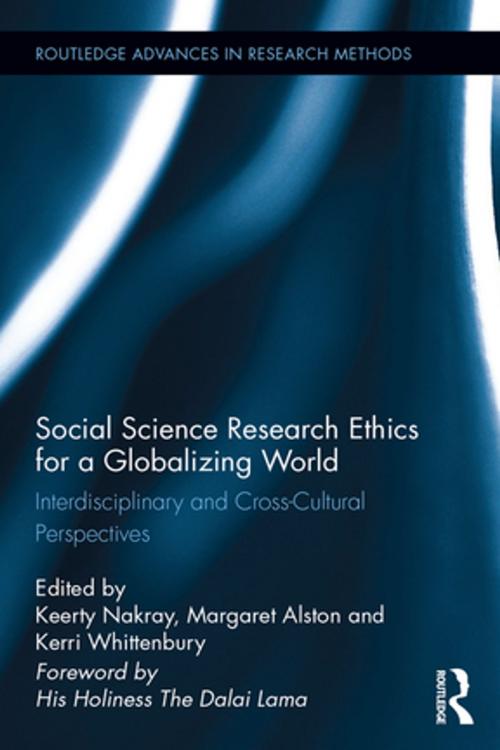Social Science Research Ethics for a Globalizing World
Interdisciplinary and Cross-Cultural Perspectives
Nonfiction, Religion & Spirituality, Philosophy, Ethics & Moral Philosophy, Social & Cultural Studies, Political Science, Social Science| Author: | ISBN: | 9781134748181 | |
| Publisher: | Taylor and Francis | Publication: | October 14, 2015 |
| Imprint: | Routledge | Language: | English |
| Author: | |
| ISBN: | 9781134748181 |
| Publisher: | Taylor and Francis |
| Publication: | October 14, 2015 |
| Imprint: | Routledge |
| Language: | English |
Research in the humanities and social sciences thrives on critical reflections that unfold with each research project, not only in terms of knowledge created, but in whether chosen methodologies served their purpose. Ethics forms the bulwark of any social science research methodology and it requires continuous engagement and reengagement for the greater advancement of knowledge. Each chapter in this book will draw from the empirical knowledge created through intensive fieldwork and provide an account of ethical questions faced by the contributors, placing them in the context of contemporary debates surrounding the theory and practice of ethics. The chapters have been thematically organized into five sections: Feminist Ethics: Cross-Cultural Reflections and Its Implications for Change; Researching Physical and Sexual Violence in Non-Academic Settings: A Need for Ethical Protocols; Human Agency, Reciprocity, Participation and Activism: Meanings for Social Science Research Ethics; Emotions, Conflict and Dangerous Fields: Issues of “Safety” and Reflective Research; and Social Science Education: Training in Ethics or “Ethical Training” and “Ethical Publicizing." This inter-disciplinary volume will interest students and researchers in academic and non-academic settings in core disciplines of Anthropology, Sociology, Law, Political Science, International Relations, Geography, or inter-disciplinary degrees in Development Studies, Health Studies, Public Health Policy, Social Policy, Health Policy, Psychology, Peace and Conflict studies, and Gender Studies. The book features a foreword by His Holiness The Dalai Lama.
Research in the humanities and social sciences thrives on critical reflections that unfold with each research project, not only in terms of knowledge created, but in whether chosen methodologies served their purpose. Ethics forms the bulwark of any social science research methodology and it requires continuous engagement and reengagement for the greater advancement of knowledge. Each chapter in this book will draw from the empirical knowledge created through intensive fieldwork and provide an account of ethical questions faced by the contributors, placing them in the context of contemporary debates surrounding the theory and practice of ethics. The chapters have been thematically organized into five sections: Feminist Ethics: Cross-Cultural Reflections and Its Implications for Change; Researching Physical and Sexual Violence in Non-Academic Settings: A Need for Ethical Protocols; Human Agency, Reciprocity, Participation and Activism: Meanings for Social Science Research Ethics; Emotions, Conflict and Dangerous Fields: Issues of “Safety” and Reflective Research; and Social Science Education: Training in Ethics or “Ethical Training” and “Ethical Publicizing." This inter-disciplinary volume will interest students and researchers in academic and non-academic settings in core disciplines of Anthropology, Sociology, Law, Political Science, International Relations, Geography, or inter-disciplinary degrees in Development Studies, Health Studies, Public Health Policy, Social Policy, Health Policy, Psychology, Peace and Conflict studies, and Gender Studies. The book features a foreword by His Holiness The Dalai Lama.















